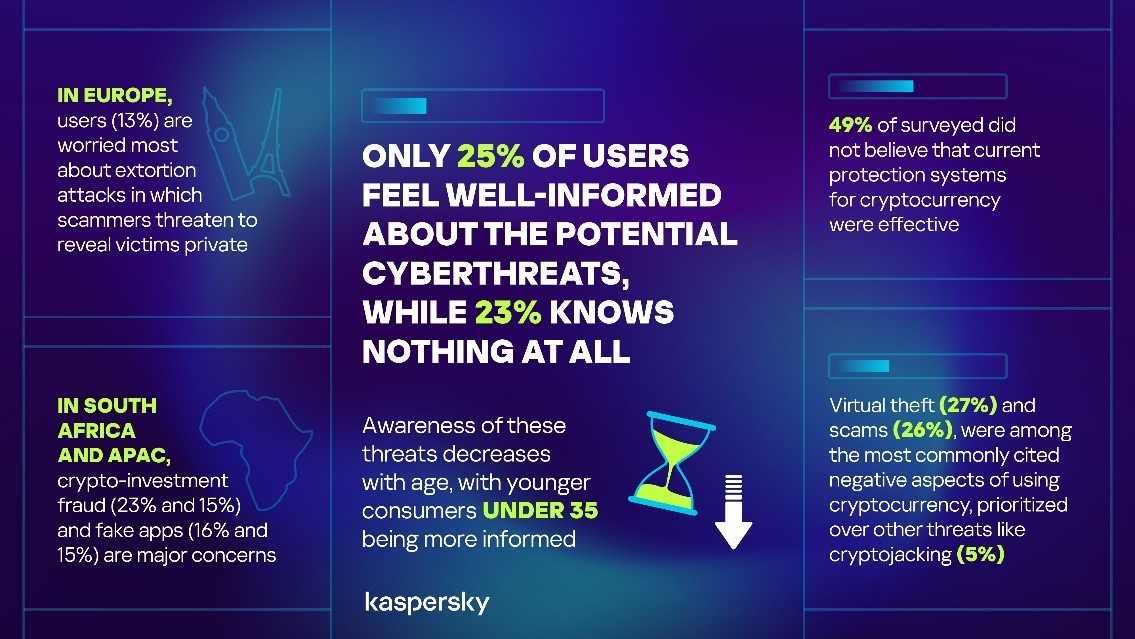Kaspersky has explored cryptocurrency user trends, finding that just 25 percent of respondents felt well informed about potential cryptocurrency cyberthreats, while 23 percent had no information at all. In a survey, Kaspersky also discovered that half respondents had been affected by cryptocurrency crime in some way, with 40 percent of crypto owners did not believe current protection systems for cryptocurrency were effective. These and other findings are in Kaspersky’s new report.
Are users familiar with cryptocurrency threats?
According to the recent survey*, a significant proportion of individuals are unaware of the potential threats faced by cryptocurrency owners. Despite the increasing popularity of cryptocurrency, only 25 percent of respondents felt extremely or very well informed about the potential risks of using it, while 23 percent had no information at all. Moreover, awareness of these threats decreases with age, with younger consumers under 35 being more informed.
Cyber threats, such as virtual theft and scams, were among the most commonly cited negative aspects of using cryptocurrency, with 27 percent and 26 percent of respondents respectively highlighting them as their top concerns. While 38 percent of respondents were unaware they could become a target of crypto threats - even if they do not own cryptocurrency. It is worth noting that anyone can become a target for cryptominers – programs that secretly generate cryptocurrency for their owners using the resources of other computers, whether they own cryptocurrency or not.

Threats concerns vary by region
In South Africa and APAC countries, crypto-investment fraud (23% and 15%, respectively) and fake apps (16% and 15%, respectively) are major concerns. Whereas in Europe, extortion attacks in which scammers threaten to reveal victims browsing history on adult websites unless they provide private keys or send cryptocurrency (13%) are the problem.
Does cryptocurrency need
more protection?
Half (49%) of all respondents had been affected
by cryptocurrency crime in some way, revealing the wide range of criminal
activities in the field. Additionally, 49 percent of surveyed individuals did not believe that
current protection systems for cryptocurrency were effective, with 40 percent of current crypto owners not believing existing
protection systems to be sufficient.
“Despite the recent cryptocurrency market downturn, the level of malicious activity in the field has not decreased. The crypto industry, still in its infancy, remains a prime target for fraudsters. This survey emphasizes the need for increased awareness and education about the potential risks faced by cryptocurrency owners. As the adoption of digital assets continues to grow, it is essential for individuals to take appropriate measures to protect themselves from cyber threats,” comments Vitaly Kamluk, the head of APAC unit, Kaspersky’s Global Research & Analysis Team.
Read the full report on Kaspersky Blog.
To learn more about the current trends of cryptocurrency threat landscape, join Vitaly Kamluk, the head of APAC’s unit of Kaspersky’s Global Research & Analysis Team, at a free webinar held by Kaspersky and Coindesk. The webinar will take place on January 26 at 3pm GMT. Register here for free.
To maximize the benefits of using cryptocurrency safely, Kaspersky experts also recommend:
- Use strong and unique passwords: creating strong and unique passwords for each of your crypto accounts can help prevent password cracking and brute force attacks.
- Avoid phishing attacks: phishing attacks are attempts to trick you into revealing your login credentials or personal information. Be wary of suspicious emails or links, and always double-check the URL before entering your login information.
- Don't share your private keys: your private keys unlock your cryptocurrency wallet. Keep them private and never share them with anyone.
- Educate yourself: stay informed about the latest cyber threats and best practices to keep your cryptocurrency safe. The more you know about protecting yourself, the better equipped you'll be to prevent cyber-attacks.
- Use security solutions: a reliable security solution will protect your devices from various types of threats. Kaspersky's portfolio prevents all known and unknown cryptocurrency fraud, as well as unauthorized use of your computer's processing power to mine cryptocurrency.
* Kaspersky commissioned Arlington Research to undertake quantitative global online research with 12,000 people from 16 countries: Austria, Brazil, Colombia, France, Germany, India, Malaysia, Mexico, Saudi Arabia, South Africa, Spain, Switzerland, Turkey, UAE, the UK, and the USA.
About Kaspersky
Kaspersky is a global cybersecurity and digital privacy company founded in 1997. Kaspersky’s deep threat intelligence and security expertise is constantly transforming into innovative security solutions and services to protect businesses, critical infrastructure, governments and consumers around the globe. The company’s comprehensive security portfolio includes leading endpoint protection and a number of specialized security solutions and services to fight sophisticated and evolving digital threats. Over 400 million users are protected by Kaspersky technologies and we help 240,000 corporate clients protect what matters most to them. Learn more at www.kaspersky.com.
